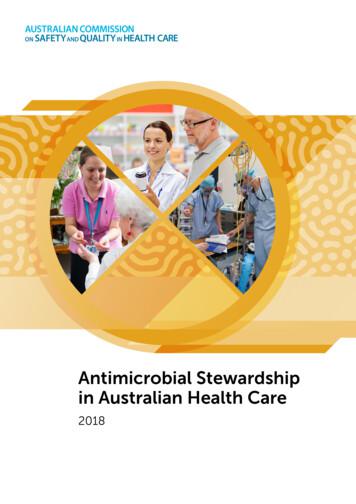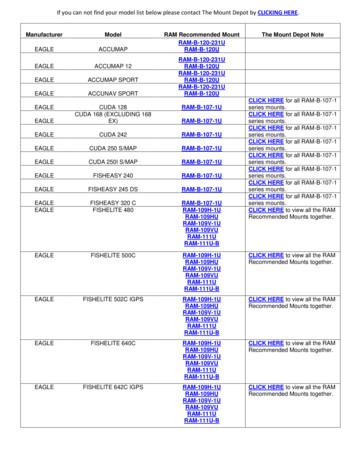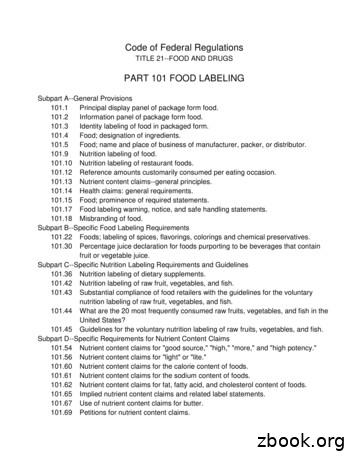STEWARDSHIP 101
STEWARDSHIP 101To Start With . . .Stewardship 101 is an overview of the various aspects of the roles and dynamicsstewardship activities play in your daily life. As a stewardship leader, how do youdetermine what are the issues, concerns, tools, and opportunities that you need toaddress in leading the stewardship ministry in your congregation? This section of MAKEIT SIMPLE provides you some beginning answers.What “Stewardship” is All AboutStewardship is about more than money. But it is about money. Your use of money andyour other possessions are an important part of your discipleship as followers of Jesus.The word “steward” comes from the Anglo-Saxon term “sty warden,” the person whotook care of the pig sty! The term has evolved to describe anyone who is the keeper ofanother person’s possessions. (To read more about the term, see the following section,“More about Stewards.”) Steward describes your relationship with God the creator. Ithelps you to see that God has “created me and all that exists” (Luther’s SmallCatechism, Apostles’ Creed, explanation of the First Article). And all that we are and allthat we have, come from God as blessing. It is your responsibility to take care of anduse wisely these blessings. They include your time, attention, physical health, energy,talents, possessions, attitudes, relationships, and money. That includes the sharing ofyour financial resources to support the ministry of the church.Stewardship ministry has a long history in the life of the church. It has often been theplace in the life of a congregation where the financial needs and realities of theorganization are addressed. In many congregations this broad-based way of thinkinghas become focused only on the congregation’s budget. And so there can be a sense ofnot having enough to pay the bills. What this leads to is conversation about meeting thebudget. Thus limited, these conversations use only fund-raising language and can leadyou away from a healthy understanding of what stewardship ministry can be for you asdisciples of Jesus.
When your use of language about stewardship is centered on the need to meet thebudget of the congregation—the need to raise sufficient funds to cover the bills—youcan lose sight of what it means to be good stewards. You might begin to think moreabout the total needed and “How much is my fair share?” You might find yourselfwrestling with what you think you can afford to give in light of the rising costs ofeverything else in your life and how much you have left over. And for some people,decisions about giving can become based on whether or not they agree with the pastor,the congregation council or some other group or individual within the church. One wayto start to reverse this trend: Separate fund-raising language from stewardshipconversations. Think how stewardship colors all of life’s decision-making, how an“attitude of gratitude” might prosper in your congregation, or how congregationmembers can inspire each other with generosity.More about StewardsThe term “steward” has its most direct etymological roots in the Anglo-Saxonstygwaerden, the sty warden noted earlier. But the concept behind the term goes backinto the first century to the Greek word, economos. In the world of the writers of theNew Testament letters, the economos was the servant or slave who served the ownerof an estate as the chief caretaker of almost everything the owner called his or herown.This caretaker was more than an obedient follower of “the household rules” (as sometranslators have rendered the term). Instead, the economos knew the economia of theowner, the over-all plan for the entire estate, both short-range and long-range. In asense, knowing the economia of the owner was almost like knowing the mind of theowner, the deepest intentions and greatest hopes of the owner.This became important when the owner was absent, and the steward/economos wasentrusted with the day-to-day affairs of the entire estate, including just about everyaspect of well-being for the property and people in the owner’s purview. Knowing theowner’s economia was the bedrock foundation on which the economos made decisionsrather than merely following rules. Thus the economos could be trusted to make valuejudgments, manage with shrewdness and careful consideration, look ahead, and stayfocused. Whatever the circumstance, then, the economos/steward was therefore wellequipped to serve the will of the owner in all things!Just think of it, when you invite people into “stewardship,” you’re inviting them into thewill of God for the world, as revealed in the Scriptures and especially in Jesus.What a privilege!2
Stewardship as a Disciple of JesusStewardship is an important daily activity in the life of a disciple of Jesus. He spokethroughout the Gospels about money and possessions. (See Luke 12 as an example.)Mostly he warned about the power and ability of possessions to separate you from yourrelationship with God. Your possessions have the power to get in the way of yourrelationship with God. You might look to them for security, put your trust in them, andtherefore treat them as idols worthy of worship.Your possessions may be joined in this idolatry by your work, your recreation, or youruse of time. In his book Work, Play and Worship in a Leisure-Oriented Society, GordonDahl challenges our American attitudes. He writes, “We worship our work, we work atour play, and we play at our worship.” What he critiques here is how society has cometo misplace its priorities and focus. When you put in 60-80 hours a week in the officeand come home on Friday with a briefcase full of work for your weekend, maybe workhas become a form of worship. If you force yourself to exercise, what has happened toyour sense of play? And when you describe your worship experience only in terms of notgetting anything out of it, what is your focus on the purpose of worship?As a disciple of Jesus, you can find a broader role for stewardship in your daily life. Youare called to be the body of Christ in the world—to do God’s work, share your blessingsreceived from God, do God’s will. That understanding of stewardship is both corporateand individual. How do you take care of all that God has blessed you with? How do youuse those blessings to accomplish God’s will for the world? This might mean tending toyour health, your relationships, your work, your possessions, your finances, yourrecreation, God’s creation, your congregation, your community, or your faith life.Stewardship in a Culture of Hyper-ConsumptionStewardship can be a difficult topic for discussion in the current culture of hyperconsumerism. You experience pressures to over-extend and find yourself overscheduled, over-worked, over-spent, and over-committed. In these times, focus onactivities that give fulfillment and meaning. You may long for a slower-paced calendar,for simpler times, for less busy-ness.If your world is framed by “instant,” you may be left frustrated and wanting—lookingfor instant news, constant contact, unlimited access, or your meals provided with nowaiting in the drive-through lane. You might seek instant gratification; abhor silence,and get constant stimulation by your MP3 players and portable DVD devices.3
Your personal life may be dominated by cell phones, credit cards, and keys. Thesethings might make you instantly available, scheduled for every opportunity, able to buywithout price, and protective of your stuff. And perhaps worst of all, you might fail tonotice the point in time where your possessions begin to possess you.How do you talk with others about stewardship in a culture of hyper-consumerism?How might you think about the possibilities of tithing to God’s mission in the worldwhen your credit cards are maxed out, your debt is burying you and your life ismeasured from paycheck to paycheck? How do you create a simpler life where you canfocus upon your relationship with Jesus, grow in your discipleship practices, and learn tobe a better steward of all that God has blessed you with?What does Jesus say? Can you hear Jesus speak about God’s abundant blessings for you?The most important question may still be this: Who will you trust? When you recognizeGod’s abundant love, grace, and blessings you realize that God has provided you witheverything you need. Jesus calls you to put your trust in him, to grow in faith throughliving as his disciples. That helps you to put your possessions back into properperspective—to possess them and not be possessed by them. Jesus invites you to putyour trust in God’s abundance, not in your possessions. When you see the motto on yourmoney—“In God We Trust”—it can be a reminder that your trust is in God! That solidtruth may help you to gain some perspective in today’s culture. Perhaps then yourconversation regarding stewardship can take on a more vibrant flavor.Stewardship Conversations Where Money Talk is TabooPerhaps until recently, you have lived in a culture where talking about money in specificterms may have been taboo. Every day you probably heard a lot about the economy,possessions, financial markets, and the price of things. But when it came to yourpersonal finances, that conversation may have been deemed unseemly. In these times,however, the necessity—and opportunity—for that kind of talk may be growing, andyour congregation may be the best place for those heartfelt conversations to takeplace.In the past, it has been rare that families would talk about their financial situation; totalk publicly about these matters would have been a social taboo. Up until the recentpast, there may have been little discussion about how financial tools and money workin this culture. And families may have rarely, if ever, had any conversation about theirgiving. Again, these times may offer or require families to have these conversations.Your congregation can help.4
How about you? How in these times might you help people break through this barrier tohave healthy conversations about their stewardship? How might you teach yourchildren (and in some ways yourself) to have better stewardship conversations andpractices?Stewardship Ministry in the CongregationAs a stewardship leader in your congregation, you are called to implement thecongregation’s stewardship ministry. This includes an annual response opportunity, aswell as a plan for year-round stewardship education that has a clear focus onstewardship practices throughout life.The annual response is a focused period of time when the life of your congregation iscentered on a stewardship response program. Often this takes place in the fall (preAdvent) or spring (Lent), but it can be done at other times of the year. The annualresponse includes an opportunity for congregational members to indicate through aCommitment Card what their anticipated giving, based on the blessings they havereceived from God, will be to support the ministry of the congregation for the comingyear. The purpose of the annual response is to encourage the congregation members toconsider, prayerfully and mindfully, their stewardship of the blessings they havereceived.Stewardship education is the ongoing year-round ministry that focuses on stewardshipas a mark of discipleship. This ministry includes a variety of activities such as Biblestudies, book study groups, sermon topics, adult forums, and congregational events.MAKE IT SIMPLE Stewardship ResourceThis entire resource can help you help your congregation grow as disciples and goodstewards of God’s blessings. The materials focus on heartfelt conversations, prayerfulreflection and practices for living more simply, trusting in God’s promises and abundantblessings, and sharing generously the blessings we have received.The biblical themes, congregational activities, Bible studies, worship resources,children’s resources, and response methods engender creativity in your congregation. Avariety of resources are included just a few keystrokes, scrolls, or mouse clicks away.The focus of stewardship ministry in your congregation can be about growing asdisciples of Jesus, strengthening the faith practices of those who participate andtogether encouraging generosity in the faithful stewardship of God’s abundantblessings.May God bless you in that endeavor!5
Stewardship Conversations Where Money Talk is Taboo Perhaps until recently, you have lived in a culture where talking about money in specific terms may have been taboo. Every day you probably heard a lot about the economy, possessions, financial markets, and the price of things. But when it came to your
Verkehrszeichen in Deutschland 05 101 Gefahrstelle 101-10* Flugbetrieb 101-11* Fußgängerüberweg 101-12* Viehtrieb, Tiere 101-15* Steinschlag 101-51* Schnee- oder Eisglätte 101-52* Splitt, Schotter 101-53* Ufer 101-54* Unzureichendes Lichtraumprofil 101-55* Bewegliche Brücke 102 Kreuzung oder Einmündung mit Vorfahrt von rechts 103 Kurve (rechts) 105 Doppelkurve (zunächst rechts)
Chapter 5: Antimicrobial stewardship education for clinicians 123 Acronyms and abbreviations 126 5.1 Introduction 127 5.2 Key elements of antimicrobial stewardship education 128 5.2.1 Audiences 128 5.2.2 Principles of education on antimicrobial stewardship 129 5.2.3 Antimicrobial stewardship competencies and standards 129
FISHFINDER 340C : RAM-101-G2U RAM-B-101-G2U . RAM-101-G2U most popular. Manufacturer Model RAM Recommended Mount The Mount Depot Note . GARMIN FISHFINDER 400C . RAM-101-G2U RAM-B-101-G2U . RAM-101-G2U most popular. GARMIN FISHFINDER 80 . RAM-101-G2U RAM-B-101-G2U . RAM-101-
UOB Plaza 1 Victoria Theatre and Victoria Concert Hall Jewel @ Buangkok . Floral Spring @ Yishun Golden Carnation Hedges Park One Balmoral 100 100 100 100 100 100 100 100 100 100 100 100 100 100 100 101 101 101 101 101 101 101 101 101. BCA GREEN MARK AWARD FOR BUILDINGS Punggol Parcvista . Mr Russell Cole aruP singaPorE PtE ltd Mr Tay Leng .
101.5, 101.8, 101.9, 101.13, 101.17, 101.36, subpart D of part 101, and part 105 of this chapter shall appear either on the principal display panel or on the information panel, u
and the Core Elements of Antibiotic Stewardship for Nursing Homes (23). This 2016 report, Core Elements of Outpatient Antibiotic Stewardship, provides guidance for antibiotic stewardship in outpatient settings and is applicable to any entity interested in improving outpatient antibiotic prescribing and use.
Luke’s views on stewardship. Hence, Mark’s views on discipleship as well as his stewardship of Saint Peter’s memories, make him an important stewardship saint in his own right. According to the Acts of the Apostles, Mark’s mother, Mary, owned a house in Jerusalem in which the earliest Christian community gathered.
10:15 am strong Stewardship /strong Bible Study & Reflection Handout: Scripture Passage 10:45am Moving from Crisis Based Pledge Campaigns to Year Round strong Generosity /strong Noon Lunch—Networking strong Stewardship /strong Conversations 12:30 pm Transformational Annual Pledge Opportunities 2:00























